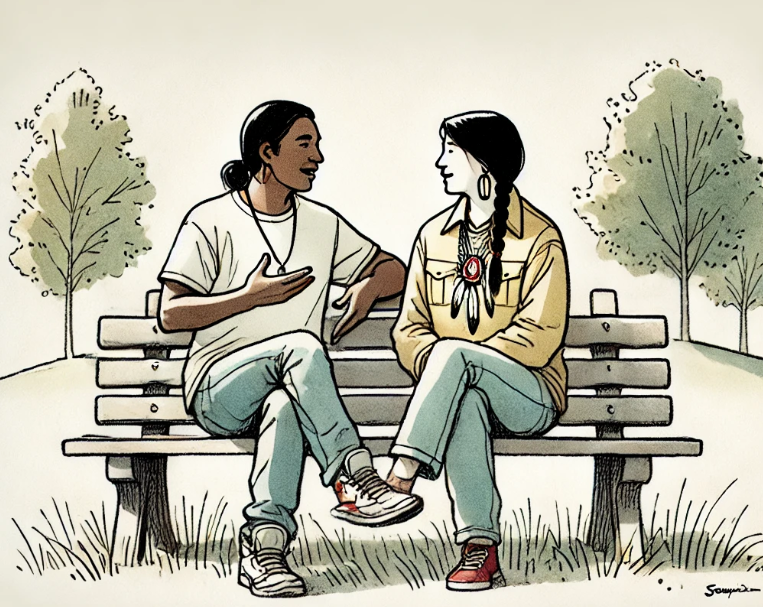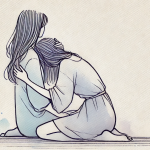
Ask Auntie: Revitalizing Sexual Health Education for Native Youth
What does it mean to grow up with questions about your body, relationships, and identity—and no one to ask? For many American Indian and Alaska Native (AIAN) youth, accessing accurate, culturally relevant sexual health information can feel like an uphill battle. Disparities in sexual health outcomes, including higher rates of STIs and teen pregnancies, persist among this population, deeply rooted in the legacy of colonization and systemic inequities.
Enter the “Ask Auntie” service, now rebranded as “Ask Your Relative” (AYR)—a groundbreaking initiative that bridges the gap between Native youth and vital health resources. Since its inception, AYR has become a trusted source of information, combining traditional wisdom with modern public health insights. This blog explores how the service is empowering a generation to reclaim control of their health and relationships.
The Legacy of Colonization on Sexual Health
Before colonization, AIAN communities celebrated fluid gender roles, open communication about sexuality, and rites of passage marking transitions into adulthood. Older women, often in the role of “aunties,” were central to teaching children about their bodies, relationships, and reproductive health through storytelling and mentoring. Colonization disrupted these traditions, replacing them with stigmatized and often harmful narratives around sexuality.
Today, AIAN youth face disproportionate rates of STIs and teen pregnancies. A lack of culturally relevant sexual education, compounded by stigma and discrimination in healthcare, exacerbates these disparities. “Ask Your Relative” emerges as a response to these challenges, offering a culturally sensitive, youth-centered platform to access critical health information.
What is ‘Ask Your Relative’?
Launched by We R Native, a multimedia health initiative for AIAN youth, AYR began as “Ask Auntie” in 2012. It provides a confidential, interactive Q&A service where teens and young adults can ask sensitive questions about sexual health, relationships, and identity. Questions are met with thoughtful responses that incorporate traditional teachings, practical advice, and trusted resources. Over the years, the service has evolved to feature a searchable library of over 590 questions, celebrity guest contributors, and faster response times for urgent queries.
Key Statistics:
- 2.37 million users have accessed AYR since its launch.
- The average time spent on the AYR page is 4 minutes and 46 seconds, far surpassing industry standards.
- Popular topics include STIs, consent, dating, and identity exploration.
What Are Native Youth Asking?
A thematic analysis of over 240 questions revealed recurring themes that highlight the complexity of issues AIAN youth face:
- Reaching Out for Help: Many youth seek advice on managing mental health, dealing with abusive relationships, or supporting friends in crisis.
- Identity and Physical Development: Questions about anatomy, puberty, and body positivity reflect a need for affirming guidance.
- Healthy Relationships: Topics range from navigating consent to understanding what constitutes a respectful partnership.
One user asked, “Can you get an STD from oral sex?”—a question that drew over 27,000 pageviews, underscoring the widespread need for clear, accessible information.
Cultural Tailoring in Action
AYR doesn’t just provide information; it honors the intersectional identities of AIAN youth. Responses often include culturally specific resources and affirmations of traditional practices, such as coming-of-age ceremonies. For instance, a youth inquired about ceremonies for their “first moon” (menstrual cycle), and the response celebrated the resurgence of these sacred teachings in many communities.
Such culturally tailored answers ensure that youth feel seen, respected, and empowered to embrace their heritage while navigating modern challenges.
How Technology Bridges the Gap
With 92% of Native youth accessing the internet via smartphones, AYR leverages digital platforms to meet them where they are. The service’s integration into We R Native’s website, social media channels, and text messaging ensures that young people can access answers privately and conveniently. This approach is particularly crucial for Two Spirit, LGBTQIA+, and other marginalized youth who may face additional barriers to seeking support.
Takeaways for Empowering AIAN Youth
The success of AYR offers valuable lessons for anyone developing health resources for underserved populations. Here are some practical tips inspired by the service:
- Make It Relatable: Use culturally relevant metaphors, symbols, and language to build trust and engagement.
- Ensure Privacy: Anonymity is key, especially when addressing sensitive topics.
- Leverage Technology: Mobile-friendly platforms and quick response times enhance usability and accessibility.
- Empower Through Knowledge: Provide actionable advice that helps youth make informed decisions, from accessing birth control to setting healthy boundaries in relationships.
Broader Implications
AYR is more than a Q&A service; it’s a step toward decolonizing sexual health education. By prioritizing Indigenous knowledge systems and intersectional frameworks, it empowers youth to build resilience, foster self-esteem, and take charge of their health. This model can inspire similar initiatives for other marginalized groups worldwide, demonstrating the transformative potential of culturally tailored health resources.
Let’s Talk About It
We’d love to hear from you! Share your thoughts in the comments or join the conversation on social media.
- How can traditional wisdom and modern health education complement each other in today’s world?
- What role does cultural identity play in shaping your approach to relationships and health?
- If you could ask “Auntie” anything, what would it be?
Let’s keep the dialogue going—because everyone deserves access to empowering, affirming health resources.
Closing Thoughts
“Ask Your Relative” exemplifies the power of blending tradition with innovation to address health disparities. Creating a safe space for AIAN youth to seek guidance fosters a sense of belonging and agency that can ripple through families, communities, and beyond. With initiatives like AYR, we move closer to a world where every young person can thrive with confidence, knowledge, and support.




